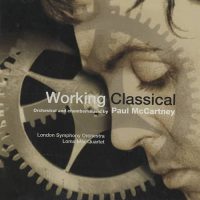
Recorded: 9 November 1998
Producer: John Fraser
Released: 18 October 1999 (UK), 19 October 1999 (US)
Available on:
Working Classical
Personnel
London Symphony Orchestra
‘Spiral’ is the fifth track on Paul McCartney’s third full-length classical music album Working Classical.
As did ‘A Leaf’, ‘Spiral’ began life as a solo piano composition. Both pieces were then arranged for a full orchestra by Jonathan Tunick, and were recorded at AIR Lyndhurst Hall studio with the London Symphony Orchestra on 23 July 1996. The recordings went unused, however.
‘Spiral’ and ‘Tuesday’ were then orchestrated by Richard Rodney Bennett, who had worked with McCartney on Standing Stone. ‘Tuesday’ was recorded at Abbey Road Studios on 10 and 11 October 1998, while ‘A Leaf’ and ‘Spiral’ were recorded on 9 November.
‘A Leaf’ and ‘Spiral’ share a common origin inasmuch as both began as solo piano pieces, but there the resemblance ends. The main waltz-time idea of ‘A Leaf’ (written shortly after the Liverpool Oratorio) has a reflective wistfulness about it that instantly draws the listener in. This is then contrasted with a section that in it’s rhythmic propulsion and use of muted trumpet in the orchestral mix has an unmistakably American vitality about it. Twinned clarinets, pungent horns and cellos, and the striking use of a solo piano show McCartney’s exuberant imagination working at full stretch, leading to a magical return of the opening material.In comparison, ‘Spiral’ is more impressionistic, much of it (despite some imposing climaxes along the way) heard as though through a heat haze. The haunting opening, featuring a solo flute memorably underpinned by a sustained chord in the strings, gradually fills out until the announcement of a little descending motif (B-A-G-E), which becomes increasingly important. The emergence of a string quartet from the orchestral texture momentarily threatens to destabilise the tonality, until the solo flute gently soothes the music’s troubled surface.
Working Classical liner notes
